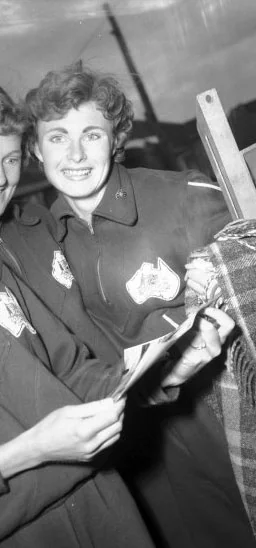
Marlene Mathews first participated in athletics in the late 1940s and ran for the Western Suburbs Club in Sydney and by the time of the 1950 Australian Women’s Championships in Adelaide she was able to finish fourth in the 80m.hurdles and was a member of New South Wales’ gold medal winning relay team.
Marlene won the sprint double at the 1951 NSW Championships but injuries forced her out of competition and consequently a chance of selection in the 1952 Olympic team.
But two years later, the situation was far rosier. She finished second in the 100 yards and third in the 220 yards at the Women’s Nationals in Perth – enough for selection in the team for the 1954 British Empire Games (Commonwealth Games) in Vancouver, Canada. But disappointment again followed when Marlene broke down in the second heat of the 100yards and failed to finish, ending her first Games campaign.
In 1956 Marlene again competed in the Women’s Nationals – held in appalling conditions in Lang Park, Brisbane. This time she took silver in the 220 yards in 25.1 and bronze in the 100 yards in 11.0. But the path to that year’s Melbourne Olympics.
At the NSW trials, Marlene lost narrowly to Betty Cuthbert over 100m but both clocked a windy 11.2, which was better than the then world record. Eventually she gained selection Olympic selection after trials in Melbourne in October when she finished second behind Cuthbert in both sprints.
In the Games, held on the Melbourne Cricket Ground, Marlene won her opening round 100m heat in 11.5 (11.81) and then her semi-final in 11.6 (11.80). In the final she was slowest out of the blocks but recovered to take bronze in 11.7 (11.94) behind Cuthbert and East German, Christa Stubnick. All the races were into strong headwinds.
In the 200m Marlene opened in similar fashion, again winning her heat (in 24.16) before finishing second in the semi-final in 24.42. The final again saw her finish third in 23.8 (24.10), once more behind Cuthbert and Stubnick.
But then quite amazingly the national selectors left Marlene out of the sprint relay team which went onto win gold in a new world record. Her omission has never been fully explained by anyone, including the selectors. Understandably, it was one of Marlene’s greatest disappointments.
A week after the Olympics, Marlene was a member of the Australian 4x220yds world record breaking relay team, which defeated Great Britain and the USA in the Commonwealth v USA Meet in Sydney.
In January, 1957 Marlene set a world record of 57.0 for 440yds at the Sydney Cricket Ground. She won the NSW 100yds title in a windy 10.1, much faster than the world record of 10.4.
At the NSW championships the following year, Cuthbert equaled Marjorie Jackson’s world record of 10.4 for the 100yds. Marlene was just inches behind her but given 10.6. Three weeks later at the National Championships in Sydney, Marlene equaled the world record in her heat and then won the final with a clear new world mark of 10.3. It was a stunning meet for Marlene, as she then won the 220yds with another world record of 23.4 beating the old mark set by Cuthbert (who was second) by a tenth.
The Commonwealth Games were held in Cardiff, Wales in 1958 and with Marlene in great form, it was her best opportunity yet to dominate. And that she did.
She won her heat and semi of the 100yds and in the final won narrowly from England’s Heather Young 10.70 to 10.73. In the 220yds, Marlene was again too good, winning her second gold in 23.65 to Cuthbert’s 23.77. This time there was no doubt about relay selection and Marlene anchored the Australian team to a silver medal in the 4x110yds event in 46.12, behind England’s new world record of 45.37.
The 1960 Women’s Nationals were held on the North Hobart Football Ground and Marlene finished third in the 100yds in 10.9 behind Pat Duggan and Cuthbert. She was then surprisingly eliminated in the heats of the 220yds in 24.3 but was selected for that year’s Olympic Games. In Rome, Marlene made it through the first round heats but was the eliminated in the semis finishing sixth in 12.05. She ran in the relay team which was unfortunately disqualified in the heats.
Marlene retired after the Rome Games and moved into sports administration and coaching. In 1972 she was appointed to the Australian Olympic Team as an assistant manager. She served as a technical official, principally as a starter, and was a most effective executive officer of the Australian Track and Field Coaches Association, and later served as its president. Marlene was recognized with life membership of Athletics Australia in 1988.
In 1979, Marlene’s contribution to the nation was acknowledged when she became a Member of the Order of Australia (AM) and again in 1999 when, as a result of her extraordinary service to sport and the community, she was elevated to the status of an Officer of the Order (AO). The Australian Sports Medal was bestowed in 2000.
In 1985 Marlene was inducted into the Sport Australia Hall of Fame and as a long serving trustee of the Sydney Cricket Ground she is recognized in its Walk of Honour.
Paul Jenes OAM
AA Statistician
President ATFS
Acknowledgements: Harry Gordon – Australia and the Olympic Games; Paul Jenes – Fields of Green, Lanes of Gold; Gary Lester – Australians at the Olympics; Graham Thomas; Jim Shepherd – Encyclopedia of Australia Sport; Progression of IAAF World Records; The Australian Women’s Register

